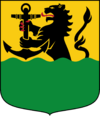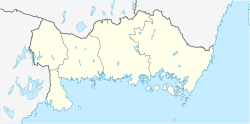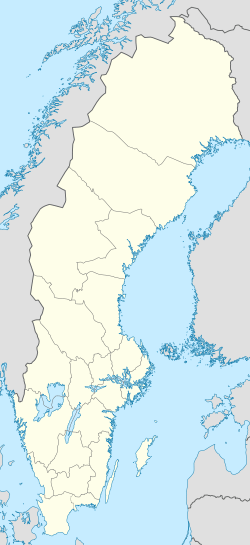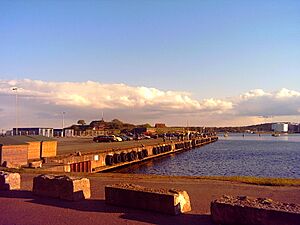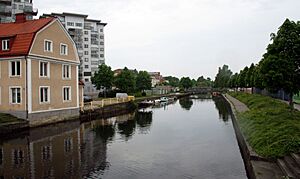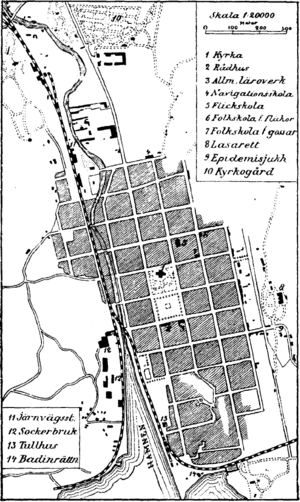Karlshamn facts for kids
Quick facts for kids
Karlshamn
|
||
|---|---|---|
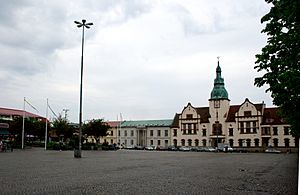
Main square
|
||
|
||
| Country | Sweden | |
| Province | Blekinge | |
| County | Blekinge County | |
| Municipality | Karlshamn Municipality | |
| Charter | 1664 | |
| Area | ||
| • Total | 13.48 km2 (5.20 sq mi) | |
| Population
(31 December 2010)
|
||
| • Total | 19,075 | |
| • Density | 1,415/km2 (3,660/sq mi) | |
| Time zone | UTC+1 (CET) | |
| • Summer (DST) | UTC+2 (CEST) | |
Karlshamn is a town in Blekinge County, Sweden. It is the main town of Karlshamn Municipality. In 2015, about 13,576 people lived here. The whole municipality had 31,846 residents.
Karlshamn became a city in 1664. King Charles X Gustav saw that its location near the Baltic Sea was very important. In 1666, the town was named Karlshamn. This means Karl's Port and honors the king.
Contents
History of Karlshamn
Long ago, there was a fishing village called "Bodekull" where the stream Mieån met the sea. There was also a farm named "Bodetorp" nearby. The lower part of the "Mörrumsån" river was famous for its rich salmon fishing.
Sweden took control of this area in 1658 after the Treaty of Roskilde. King Charles X Gustav quickly saw how perfect the harbor was. Strong forts were built to protect it. One fort was on Boön in 1659. Another, called "Kastellet," was built on Friesholmen in 1675.
Danish troops attacked the town twice between 1676 and 1678. But the location kept attracting traders from other countries. In 1664, the king gave the town special rights to grow. It was named "Karl's Port" after him. The town grew very fast. By 1700, it had 647 citizens. However, a sickness in 1710 reduced the population.
During the 1700s, new businesses started. They used products from farming and minerals. Fires destroyed parts of the town in 1763 and 1790. In the early 1800s, Karlshamn became a busy trading town. This helped its citizens become wealthy.
Local products like punch, tobacco, and snuff powder were made here. Skilled craftspeople were common until about 1880. Then, factories started making more goods. By 1883, the town had 6,529 citizens.
Railways helped Karlshamn connect to other places. A railway to Vislanda opened in 1874. The coastal railway was built in 1890. In 1876, L.O. Smith started making a drink called aquavit in town. He built a new factory in 1884. This factory later became a sugar refinery. In 1912, it started making vegetable oil. This business still runs today under the name AAK.
From about 1850 to 1940, cutting granite stone was a big export business. A paper mill was built in Mörrum in 1962. Since 1975, Karlshamn's port activities have moved to Stilleryd, west of town. A new hospital opened in 1965.
Climate in Karlshamn
Karlshamn has an oceanic climate, which is common in Southern Sweden. This means it has mild winters for its location and fairly warm summers. Being on the coast in the south makes autumns especially mild. The amount of rain changes a lot each year, depending on the wind.
| Climate data for Karlshamn 2002–2021 (extremes since 1901) | |||||||||||||
|---|---|---|---|---|---|---|---|---|---|---|---|---|---|
| Month | Jan | Feb | Mar | Apr | May | Jun | Jul | Aug | Sep | Oct | Nov | Dec | Year |
| Record high °C (°F) | 11.6 (52.9) |
16.7 (62.1) |
20.6 (69.1) |
25.5 (77.9) |
27.9 (82.2) |
32.0 (89.6) |
32.0 (89.6) |
33.0 (91.4) |
27.1 (80.8) |
22.1 (71.8) |
14.8 (58.6) |
12.7 (54.9) |
33.0 (91.4) |
| Mean maximum °C (°F) | 8.1 (46.6) |
9.5 (49.1) |
14.5 (58.1) |
19.3 (66.7) |
24.5 (76.1) |
27.1 (80.8) |
28.3 (82.9) |
27.1 (80.8) |
23.0 (73.4) |
17.4 (63.3) |
12.6 (54.7) |
9.3 (48.7) |
29.7 (85.5) |
| Mean daily maximum °C (°F) | 2.8 (37.0) |
3.5 (38.3) |
7.1 (44.8) |
12.2 (54.0) |
17.0 (62.6) |
20.8 (69.4) |
22.7 (72.9) |
22.1 (71.8) |
18.3 (64.9) |
12.4 (54.3) |
7.8 (46.0) |
4.4 (39.9) |
12.6 (54.7) |
| Daily mean °C (°F) | 0.4 (32.7) |
0.7 (33.3) |
3.1 (37.6) |
7.2 (45.0) |
11.9 (53.4) |
15.8 (60.4) |
18.1 (64.6) |
17.5 (63.5) |
13.9 (57.0) |
8.9 (48.0) |
5.3 (41.5) |
2.2 (36.0) |
8.8 (47.8) |
| Mean daily minimum °C (°F) | −2.0 (28.4) |
−2.1 (28.2) |
−0.9 (30.4) |
2.1 (35.8) |
6.7 (44.1) |
10.7 (51.3) |
13.4 (56.1) |
12.9 (55.2) |
9.5 (49.1) |
5.3 (41.5) |
2.7 (36.9) |
−0.3 (31.5) |
4.8 (40.7) |
| Mean minimum °C (°F) | −11.8 (10.8) |
−10.1 (13.8) |
−8.3 (17.1) |
−3.5 (25.7) |
0.2 (32.4) |
5.0 (41.0) |
8.6 (47.5) |
7.0 (44.6) |
2.5 (36.5) |
−2.9 (26.8) |
−5.8 (21.6) |
−9.5 (14.9) |
−13.8 (7.2) |
| Record low °C (°F) | −27.0 (−16.6) |
−22.5 (−8.5) |
−19.5 (−3.1) |
−5.7 (21.7) |
−3.3 (26.1) |
−1.2 (29.8) |
3.0 (37.4) |
2.7 (36.9) |
−1.8 (28.8) |
−8.6 (16.5) |
−14.0 (6.8) |
−20.7 (−5.3) |
−27.0 (−16.6) |
| Average precipitation mm (inches) | 51.8 (2.04) |
37.2 (1.46) |
36.4 (1.43) |
27.0 (1.06) |
39.3 (1.55) |
57.0 (2.24) |
63.8 (2.51) |
62.5 (2.46) |
40.8 (1.61) |
65.3 (2.57) |
62.0 (2.44) |
56.2 (2.21) |
599.3 (23.58) |
| Source 1: SMHI Open Data for Karlshamn, precipitation | |||||||||||||
| Source 2: SMHI Open Data for Karlshamn, temperature | |||||||||||||
Education in Karlshamn
University Studies
A part of the Blekinge Institute of Technology (BTH) opened in Karlshamn in 2000. This campus focuses on media technology. Students can learn about digital games, making digital videos, creating digital audio, and working with web technologies.
Schools for Younger Students
Väggaskolan is the upper secondary school in Karlshamn. This is for students in grades 10 to 13. There are also many primary schools for younger students (grades 0-9) located in different parts of the town.
Culture and Arts
Performing Arts and Music
"Teatersmedjan" is a local theater group. It has members of all ages, but mostly young people. They practice and perform in a building that used to be a locomotive workshop, called "Lokstallarna." This place is also used by young music bands, known as "Musikforum." A famous music producer from Karlshamn, Johan "Shellback" Schuster, helped save "Musikforum" financially in 2014.
Karlshamn has several singing choirs. The "Karlshamn Chamber Choir" and "ABF-kören" are two well-known ones. Local churches also have choirs. For classical music, you can listen to "Karlshamns musiksällskap." "Karlshamns musikkår" is a band that plays wind instruments and often marches through the city in summer. The jazz club "Munthe" invites musicians to play at the "Gourmet Grön" restaurant.
Every summer, in the third week of July, a music festival called "Östersjöfestivalen" is held in the town center. There is also a municipal music school for students.
Media and Literature
"Karlshamns Allehanda" is the local daily newspaper. It started in the 1800s. Since 2003, it has joined with "Blekinge Läns Tidning," a regional newspaper. Another newspaper that covers the area is "Sydöstran." Local radio and TV stations are based in Karlskrona, the main town of the county.
Karlshamn is famous in literature too. It is the port where Karl Oskar and Kristina Nilsson left for America in 1850. This story is told in the well-known historical novels called The Emigrants by Vilhelm Moberg.
Town Plan and Buildings
The first settlement of Bodekull was on the flat land between the steep rocks. The person who designed Karlshamn's town plan in 1666 is not known. This first map showed 24 square blocks, with one open as a main square. The main street, "Drottninggatan," runs next to the river and leads to the inner harbor. The town's grid plan slowly grew during the 1700s and 1800s. Later, the town expanded over fields and hills. It eventually joined with Asarum, a village north of town.
Two old houses from the town's early days are still at the main square. One is "Asschierska huset," which was built as the town hall in 1682. The town's streets were neatly lined with one or two-story buildings. A block was often divided into ten plots on richer streets, and even smaller plots in poorer areas.
The church was built north of the square between 1680 and 1702. Its design was approved by Erik Dahlbergh. The separate bell tower was added in 1792. "Skottsbergska gården" is a complete set of merchant buildings from 1766. It is now open for visitors to see.
In the early 1800s, the town's merchants became very successful. They added more floors and decorations to their buildings. Later, several public buildings were built. These include the school at the square (1864), the girls' school (1879), and the hospital (1883). The "realskola" school was designed by architect Gunnar Asplund in 1912-17. He added a modern part in 1929. The current town hall was built south of the square in 1900. It was greatly expanded between 1990 and 1995.
Tall Structures
Near Karlshamn, in the village of Gungvala, you can find Gungvalamasten. This is a very tall mast, 335 meters high, used for FM and TV signals. It is one of the tallest structures in Sweden, along with three other masts of the same height.
In Karlshamn, there is also the Stärnö Power Station. It has three chimneys. This station is part of the HVDC SwePol system, which is a power cable that connects Sweden to Poland.
Tourism and Fun
Karlshamn is a great place for visitors. You can enjoy salmon fishing in "Mörrumsån." The rocky coastline and the Hällaryd archipelago are perfect for exploring. The wooded areas inland are also beautiful.
East of the city center is the famous Eriksbergs Viltpark. This used to be a farm. Now, it is home to many native animals like European Bison, Crown Deer, Moose, and wild boar. Tourism is busiest from June to August. During this time, you can take regular boat trips to islands like Tärnö.
Sports Clubs
Karlshamn has several sports clubs for different activities:
- IFK Karlshamn - football
- Högadals IS - football
- CI85 - floorball
- Karlshamns HF - handball
Getting Around
Karlshamn's network of bike paths is growing. It connects towns like Mörrum, Svängsta, Asarum, and Karlshamn. Most roads are paved. The main European road E22 goes through the municipality. National road 29 connects the port to the Småland province in the north.
The "Blekinge kustbana" railway was made electric in 2006. It connects the towns in the region with trains running every hour. The port in Stilleryd is one of the busiest in Sweden for cargo. It is the largest and deepest port in southeast Sweden. There is also a regular ferry service to Klaipėda in Lithuania.
Famous People from Karlshamn
- Christopher Schröder (1628–1699), a mayor of Karlshamn
- Alice Tegnér (1864–1943), a songwriter
- Lars Olsson Smith (1836–1913), a business owner
- Janne M. Sjödahl (1853–1939), an author
- Ida Schmidt (1857–1932), a women's rights activist, teacher, and politician
- Bengt Berg (1885–1967), an expert on birds, author, and photographer
- Git Gay (1921–2007), a cabaret performer
- Per Ragnar (born 1941), an actor
- Per Svensson (born 1965), an actor
- Ola Lindholm (born 1970), a TV host
- Johan Petersson (born 1973), a handball player
- Bingo Rimér (born 1975), a photographer
- Emma Igelström (born 1980), a champion swimmer
- Blinded Colony, a metal band started in 2000
- Shellback (real name Johan Schuster, born 1985), a songwriter, music producer, and musician
See also
 In Spanish: Karlshamn para niños
In Spanish: Karlshamn para niños
 | James Van Der Zee |
 | Alma Thomas |
 | Ellis Wilson |
 | Margaret Taylor-Burroughs |


